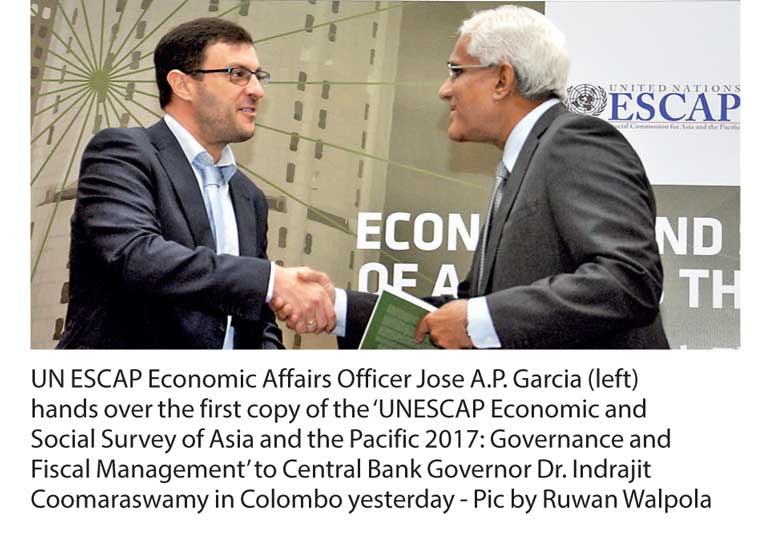Wednesday Feb 18, 2026
Wednesday Feb 18, 2026
Wednesday, 10 May 2017 00:05 - - {{hitsCtrl.values.hits}}

By Charumini de Silva
The United Nations Economic and Social Commission for Asia and the Pacific (UNESCAP) is forecasting Sri Lanka’s economy to grow by 4.8% this year, marginally up from 4.4% in 2016.
However the UNESCAP estimate is slightly lower than the Central Bank’s forecast of 5% for 2017.
The UNESCAP Economic and Social Survey of Asia and the Pacific 2017 released yesterday in Colombo stated that Sri Lanka’s medium-term economic development is contingent upon the success of reforms designed to reduce stubbornly large fiscal and trade deficits.
The report said that the growth outlook is expected to rebound modestly to 4.8% in 2017 and 4.9% in 2018 and pointed out that a major headwind to stronger prospects, however, is fiscal tightening which would constrain consumer spending and public investment, especially in an environment of higher domestic interest rates.
While highlighting that public debt stands at close to 80% of GDP, with a large share being foreign currency denominated, the report shows that the Government has strengthened its fiscal consolidation program by increasing the value-added tax rate from 11% to 15% by imposing various taxes including Capital Gains Tax and a Carbon Tax for motor vehicles. There are also efforts to tax e-commerce transactions, reform State-owned enterprises and improve tax administration.
“This year’s theme of the report ‘Governance and Fiscal Management’ is of utmost importance to Sri Lanka’s effective fiscal management, which makes it a useful tool for policymakers within Sri Lanka and the region,” Central Bank Governor Dr. Indrajit Coomaraswamy said while delivering the keynote address at the launch which was graced by United Nations Resident Coordinator in Sri Lanka Una McCauley, ESCAP Economic Affairs Officer Jose Antonio Pedrosa Garcia and Verite Research Director Subhashini Abeysinghe.
The Governor pointed out that Sri Lanka needs to have a strategic growth model based on an attractive private sector, exports and a large component of foreign direct investments (FDIs).
Although it is a time when the global economy is experiencing sluggish growth coupled with low international trade, Dr. Coomaraswamy asserted that Sri Lanka’s favourable location and excellent international relations with many countries would triumph against external headwinds.
“We can leverage on our location. The geopolitical dynamics of the Indian Ocean region are playing to our advantage to get support from major economies like India, China, Japan and even the West,” he added.
However, he stressed that it was important for Sri Lanka to get the right policy framework, macroeconomic policy framework, investment climate, investment promotion, trade policy and trade facilitation.
Acknowledging that the Government was working on all these aspects, although it ideally should be faster, he said: “Sri Lanka can buck the Asian trend and have a growth model which is based upon external demand.”
He pointed out that the budget deficit as the major source of instability in the system for decades characterised the economy with high inflation, high interest rates, high deficit and an overvalued exchange rate.
As far as fiscal consolidation was concerned, Dr. Coomaraswamy said the main adjustment was going to be on the revenue side. “Revenue has slipped down to 11% of the GDP. Part of the reason was during the war the Government had a risk premium attached to the economy, but now there is no such risk, our infrastructure is gradually improving, there were many incentives given. In future the Government will only give upfront investment-related capital formation.”
He said the idea is to collect revenue, which is evident through the VAT reforms and the new Inland Revenue Act. Noting that Sri Lanka has one of the most regressive tax systems in the world, Dr. Coomaraswamy said challenges remained in improving revenue as well as in changing the composition of taxes.
Noting that the overall public expenditure of 20% to GDP was not alarming, he said there are issues in relation to the composition and quality of expenditure. “Overall expenditure is pretty acceptable, the adjustments has to come from the revenue side.”
Referring to the ESCAP report that has paid special emphasis to domestic demand, he said: “In Sri Lanka for me, the challenge remains exactly the opposite. We have relied too much on domestic demand. Our tradable goods sector has dropped from 80% GDP in 2000 to 45% now, while exports have declined from 32% to 11% of GDP.”
Analysing the report, ESCAP Economic Affairs Officer Garcia said that supported by steady economic growth, the Asia Pacific region is poised to regain its historical position in the global economy and provide leadership to move towards inclusive and sustainable development.
However, he highlighted that there is room for fiscal policy to take a more prominent role in contributing to long-term economic potential, enhancing social protection as well as addressing environmental degradation.
“Proactive fiscal policy highlights the vital role of governance such as to mobilise resources effectively and to use them efficiently. Thus, enhanced transparency and accountability is key to improving quality of governance,” Garcia said.
He also pointed out that the wellbeing of people depended on much more than just economic growth, and there was a need in the region to pay more attention to social inclusiveness and environmental sustainability.